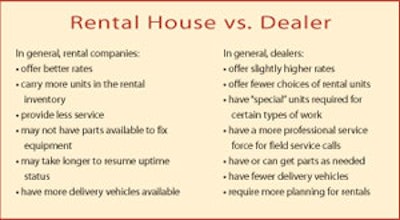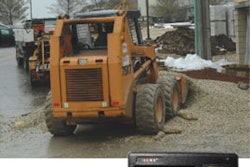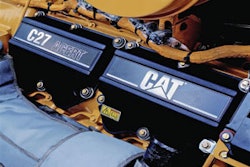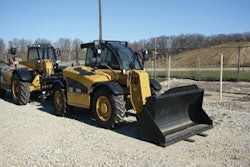
You hear a lot about this topic lately. And it's only going to intensify as you continue to see a commingling of the dealer/rental (or is it the rental/dealer?) business.
I just returned from CONEXPO-CON/AGG, and many of the manufacturers I spoke to indicate they plan to sell more to rental companies and assist with servicing rental equipment. Many of the rental companies plan to sell more new units; aggressively sell used equipment coming off the rental fleet; sell parts; and do service work on customer-owned units. I don't know about you, but it's getting tougher and tougher to recognize a dealer from a rental company. But the real question is what does this mean for you as a customer?
Consider the pros and cons
No matter how you look at it, equipment is a big part of your business and profit plan. That doesn't mean you have to own it, as long as you can bring the proper utility value to the jobsite. What you ultimately want is the utility value and uptime a particular piece of equipment can provide at a given point of time.
I guess the question is with whom do you do business - a rental company or a dealer - to get the required utility value? Are there advantages one has over the other? Do the services compare? How about the rates?
At this stage of the game, both dealers and rental houses offer different advantages to be used by contractors. Neither distribution channel at this point offers complete equipment and service capabilities. The market is evolving and will wind up where contractors determine the best values are available.
Rental companies typically offer better rates; provide less service than a dealer; may not have parts available to fix equipment; may take longer to resume uptime status; carry more units in the rental inventory; and have more delivery vehicles available.
There are both positive and negatives listed here. But from a contractor's point of view, all the problem issues disappear as long as the unit shows up on time, is the model and size ordered, runs properly during the engagement and is picked up on time. The utility value of the equipment was transferred for the rental payment and everybody's happy. However, if problems did surface and you lost time on the job because of them, the cheaper rates and equipment availability didn't do you much good.
Compared to rental companies, dealers tend to offer fewer rental units to choose from, but have "special" units required for certain types of work; have a more professional service force to respond to field service calls and minimize downtime; normally have or can get parts as needed; offer a little higher rates; have fewer delivery vehicles to ensure "on-time" delivery at a jobsite; and require a little more planning to work with on rentals.
Essentially, if problems occur, dealers are in a better position to deal with them and get you going again. If no problems arise, you may have paid a little more and incurred some additional aggravation, but you received a little insurance in the process.
What "value" means to you
If I were in your shoes, I would want the utility value when I want it with as little aggravation and cost as possible. Nice concept, but value means different things to different contractors. Those using heavy, complicated pieces of equipment may require one set of values from equipment vendors, and those using "commodity" type units may require another.
If I were using a big piece of equipment that I couldn't replace and couldn't have go down for any length of time, I would have to lean toward a dealer to provide the rental. Conversely, if I were using multiple small pieces of equipment, I might find the rental company alternative more attractive as long as equipment can be replaced by a similar unit in a reasonable amount of time. In both cases, there would be valid reasons to use that particular vendor.
So how would I choose my rental source? It would be based on:
- Availability
- Cost of downtime
- Service and parts resources
- Price
You can score each line item depending on the work you do or the job you are working on. For some of you, the cost of downtime and the service issue will push you to a dealer. For others, the first three scores may be so low that price is the factor that governs. As time goes on, however, the choices between types of vendors may become fewer and fewer.


















